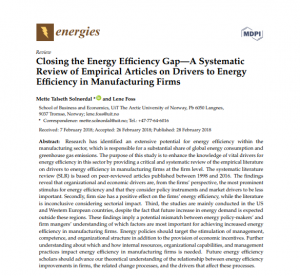Full Title: Closing the Energy Efficiency Gap—A Systematic Review of Empirical Articles on Drivers to Energy Efficiency in Manufacturing Firms
Author(s): Mette Talseth Solnørdal and Lene Foss
Publisher(s): Energies
Publication Date: February 1, 2018
Full Text: Download Resource
Description (excerpt):
Research has identified an extensive potential for energy efficiency within the manufacturing sector, which is responsible for a substantial share of global energy consumption and greenhouse gas emissions. The purpose of this study is to enhance the knowledge of vital drivers for energy efficiency in this sector by providing a critical and systematic review of the empirical literature on drivers to energy efficiency in manufacturing firms at the firm level. The systematic literature review (SLR) is based on peer-reviewed articles published between 1998 and 2016. The findings reveal that organizational and economic drivers are, from the firms’ perspective, the most prominent stimulus for energy efficiency and that they consider policy instruments and market drivers to be less important. Secondly, firm size has a positive effect on the firms’ energy efficiency, while the literature is inconclusive considering sectorial impact. Third, the studies are mainly conducted in the US and Western European countries, despite the fact that future increase in energy demand is expected outside these regions. These findings imply a potential mismatch between energy policy-makers’ and firm mangers’ understanding of which factors are most important for achieving increased energy efficiency in manufacturing firms. Energy policies should target the stimulation of management, competence, and organizational structure in addition to the provision of economic incentives. Further understanding about which and how internal resources, organizational capabilities, and management practices impact energy efficiency in manufacturing firms is needed. Future energy efficiency scholars should advance our theoretical understanding of the relationship between energy efficiency improvements in firms, the related change processes, and the drivers that affect these processes.
